The Scopes Monkey Trial at 100: Why People Don't Accept the Theory of Evolution
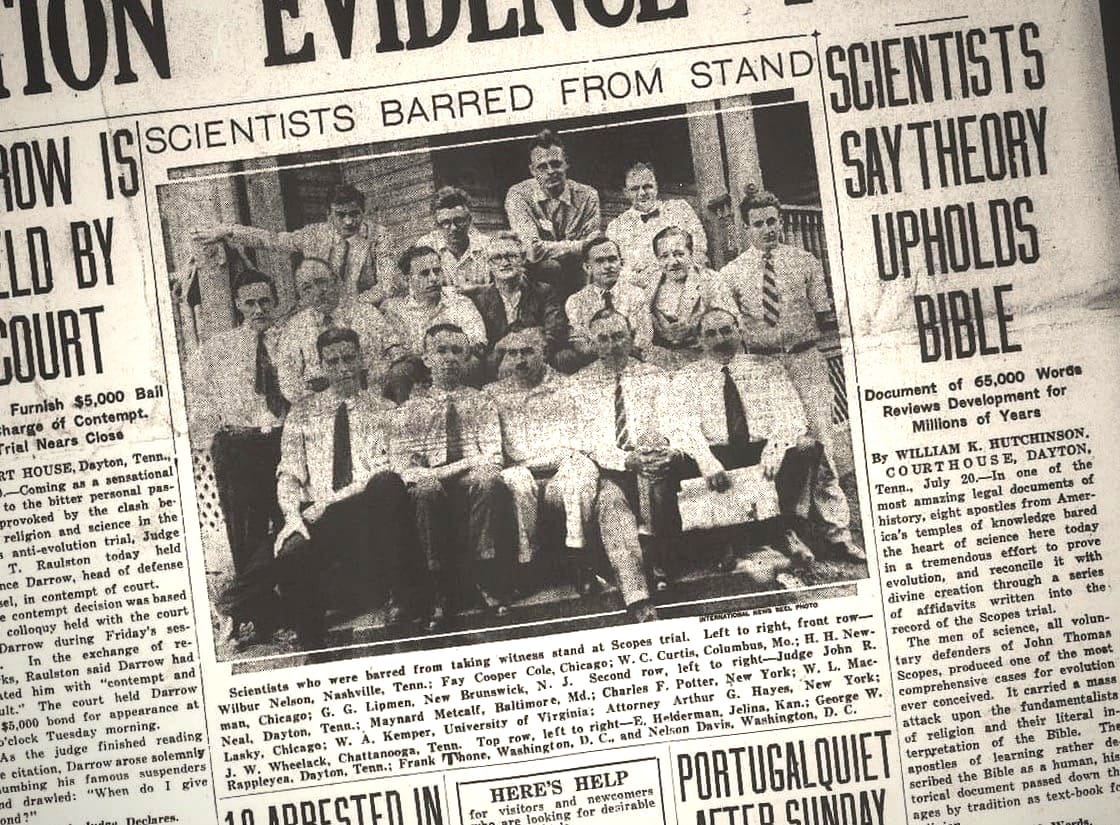
The real attack of evolution, it will be seen, is not upon orthodox Christianity or even upon Christianity, but upon religion—the most basic fact in man’s existence and the most practical thing in life. If taken seriously and made the basis of a philosophy of life, it would eliminate love and carry man back to a struggle of tooth and claw.
—William Jennings Bryan, from his final statement at the Scopes Trial, 1925
On a thickly muggy and stiflingly hot summer day in 1925, a man arose to speak at the end of what had developed into the trial of the century. His speech had been carefully crafted to express the deeper meaning about what was really on trial in that courtroom in Dayton, Tennessee. It was not, as most observers believed, whether high school science teacher John T. Scopes had lectured his students on Charles Darwin’s theory of evolution. It was, in effect, humanity’s soul that was on trial. “The soul is immortal and religion deals with the soul; the logical effect of the evolutionary hypothesis is to undermine religion and thus affect the soul,” he pronounced in a statement epigrammatically poignant.
The speaker was William Jennings Bryan, and although he was never allowed to deliver his final speech in the Scopes “Monkey Trial” (the judge determined that it was irrelevant to the case, the same ruling he made against the defense when they called on evolutionary biologists as expert witnesses), it was subsequently published in booklet form as Bryan’s Last Speech: The Most Powerful Argument Against Evolution Ever Made,1 published shortly after his death and reprinted in full in Skeptic, Vol. 4, No. 2. (The booklet was sent to me by my friend and historian colleague Clayton Drees, who found it in a used bookstore in Virginia. It came with the following handwritten inscription from its original owner: “I bought this book soon after the Scopes trial. Wallace and I were traveling through Florida at the time.”)
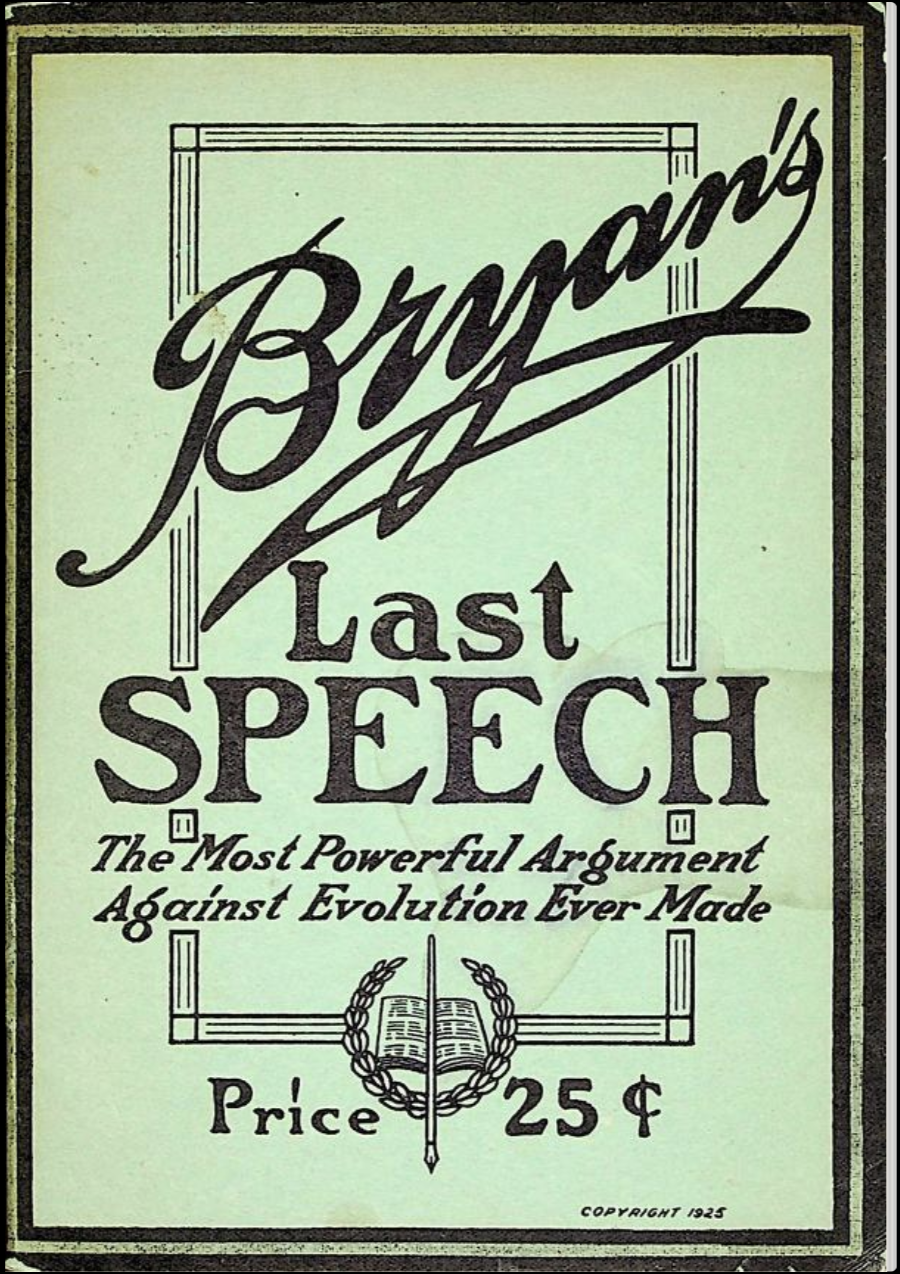
In the dramatic film adaptation of the trial, Inherit the Wind, Bryan starts to deliver his speech as the trial participants begin to filter out of the courtroom, but then he dramatically keels over dead to the gasps of his faithful followers and the chagrin of his evolutionary opponents. The reality was perhaps a bit less histrionic (Bryan died rather unceremoniously two days after the trial’s end), but the real speech is much more revealing (in the film he is reduced to reciting the books of the Bible). The speech is an insight into what he and so many others were and—a century later—still are thinking and fearing about the theory of evolution, and Bryan College in Dayton, Tennessee stands as his monument.
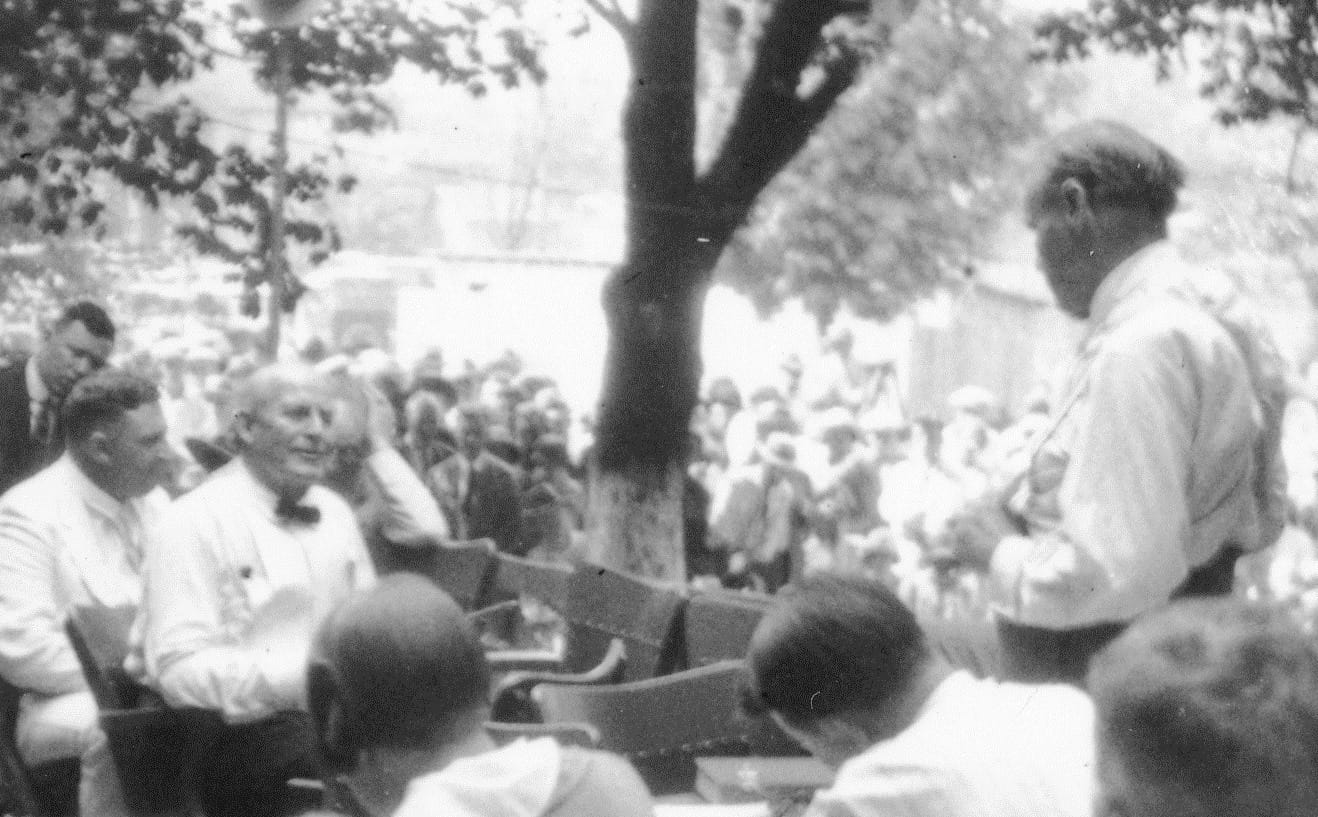
The Real Meaning of the Scopes Trial
Forget the Lindbergh kidnapping trial, the Manson murder trial, or even the O.J. televised media trial. The real trial of the 20th century was the Scopes Trial. It was bigger than life, from the issues at hand to the characters involved.2 The trial was initially instigated as a publicity stunt dreamed up by the fledgling American Civil Liberties Union (ACLU), in collaboration with the city leaders of the economically struggling Tennessee town of Dayton. On one side of the dock was the most famous defense attorney of his era, Clarence Darrow. On the other was the century’s preeminent orator and defender-of-the-faith, three-time presidential candidate William Jennings Bryan. Covering the trial for the Baltimore Sun was the unapologetically cynical reporter H. L. Mencken, who meted out such barbs as this:3
If the Anti-Evolutionists in Tennessee were aware of the existence of any other religions than their own, they might realize that it is the very genius of religion itself to evolve from primary forms to higher forms. The author of the anti-evolution bill is obviously nearer in mental development to the nomads of early biblical times than he is to the intelligence of the young man who is under trial.
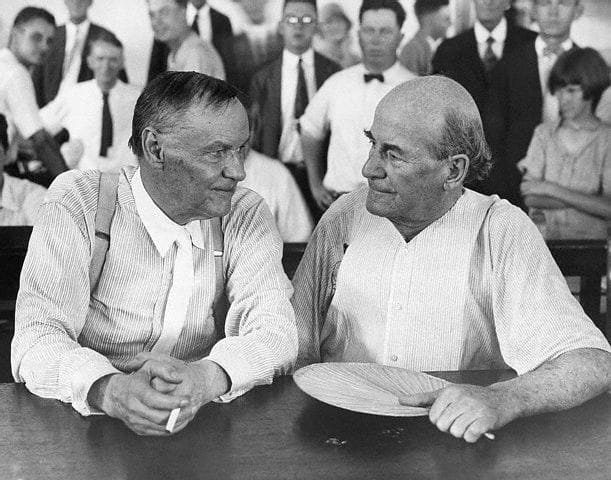
That young man was John Thomas Scopes, a substitute teacher from a neighboring county who, by his own admission, volunteered to challenge Tennessee’s “anti-evolution” law because, in addition to being a free thinker, he thought that the extended stay in Dayton over the summer and the ensuing attention might help his cause in a local love interest.
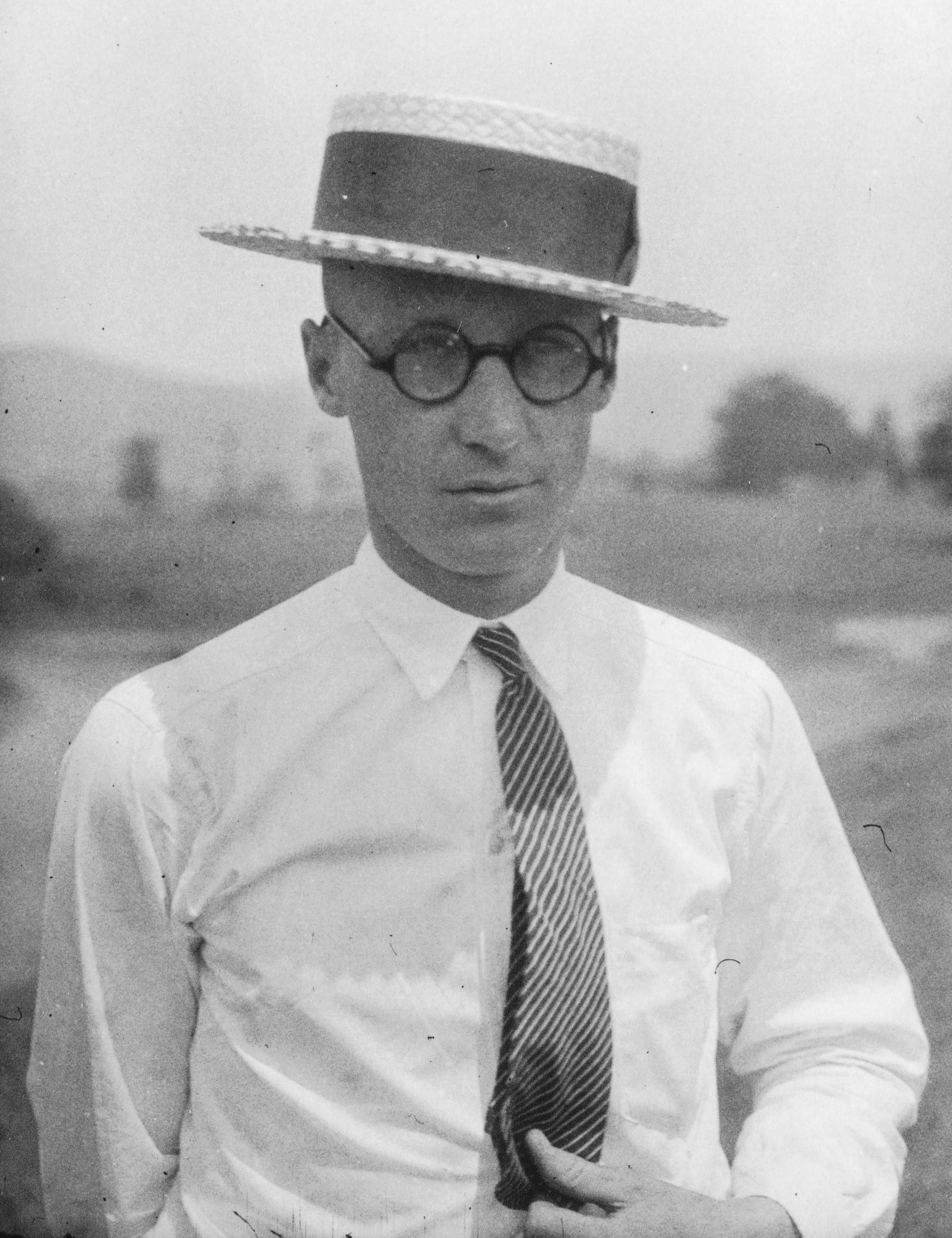
In 1923, Oklahoma passed a bill offering free textbooks to public schools on the condition that neither the teachers nor the textbooks mentioned evolution, and Florida went even further by passing an antievolution law. In 1925, the Butler Act, which made it “unlawful for any teacher in any of the Universities, Normals and all other public schools of the state…to teach any theory that denies the story of the Divine Creation of man as taught in the Bible, and to teach instead that man has descended from a lower order of animals,” was passed by the Tennessee legislature. This act was viewed as an obvious
violation of civil liberties and that is why the ACLU took up the case, which they hoped to lose in Dayton, which would lead to an appeal to the Tennessee State Supreme Court, and eventually a hearing in the U.S. Supreme Court, which they hoped would set a precedent for other such bills. And most people think that Scopes and science scored a knockout victory in Tennessee. Reading Mencken would certainly lead to this conclusion. Of Bryan he gibed:
Once he had one leg in the White House and the nation trembled under his roars. Now he is a tinpot pope in the Coca-Cola belt and a brother to the forlorn pastors who belabor half-wits in galvanized iron tabernacles behind the railroad yards…It is a tragedy, indeed, to begin life as a hero and to end it as a buffoon.
In fact, this was no victory for science or evolution, and it may surprise readers to learn that Scopes’ guilty verdict was overturned on a minor technicality involving the levying of a fine over $50 by a judge instead of a jury. Out of embarrassment by the bad publicity the state was receiving, the Tennessee state legislators used this technical misstep to prevent the case from reaching the State Supreme Court. Who can blame them after reading comments like this about the trial from Mencken:
Let no one mistake it for comedy, farcical though it may be in all its details. It serves notice on the country that Neanderthal man is organizing in these forlorn backwaters of the land, led by a fanatic, rid of sense and devoid of conscience. Tennessee, challenging him too timorously and too late, now sees its courts converted into camp meetings and its Bill of Rights made a mock of by its sworn officers of the law.
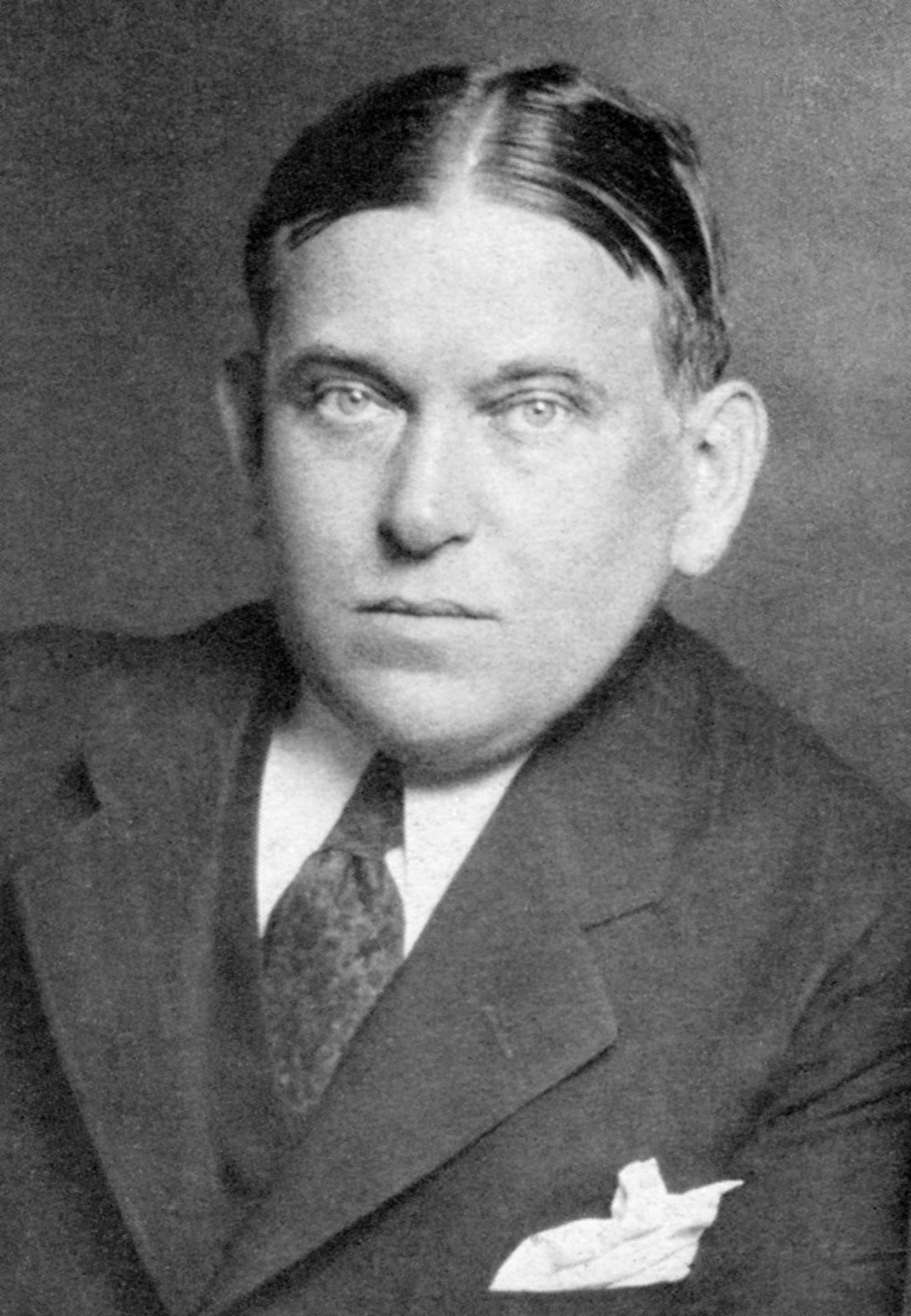
Worse, the controversy stirred by the trial made textbook publishers and state boards of education reluctant to deal with evolution in any manner. A study by Judith Grabiner and Peter Miller on high school biology textbooks before and after the trial revealed that the subject of evolution simply disappeared from the curriculum and was not taught for decades: “Believing that they had won in the forum of public opinion, the evolutionists of the late 1920s in fact lost on their original battleground—teaching of evolution in the high schools—as judged by the content of the average high school biology textbooks [which] declined after the Scopes trial.”4
Bryan’s story reveals a common fear many people hold about the theory of evolution. A liberal and free thinker on so many other issues, Bryan took a stand against evolutionary theory after the First World War, when he became aware of the use of social Darwinism to justify militarism, imperialism, eugenics, and what he saw as “paralyzing the hope of reform” through its program of “scientific breeding, a system under which a few supposedly superior intellects, self-appointed, would direct the mating and the movements of the mass of mankind.” Bryan developed this view after reading the entomologist Vernon L. Kellog’s 1917 book Headquarters Nights, a recounting of Kellog’s evenings spent with German military and intellectual leaders who justified their militarism and imperialistic expansionism with classic social Darwinism—national survival of the fittest, improvement of the superior Germanic race, and elimination of unfit races.5
Bryan became concerned for both his faith and his country, but the enemy was not Germany; it was evolutionary theory. “The evolutionary hypothesis carried to its logical conclusion, disputes every vital truth of the Bible,” Bryan opined in his final speech. “Its tendency, naturally, if not inevitably, is to lead those who really accept it, first to agnosticism and then to atheism. Evolutionists attack the truth of the Bible, not openly at first, but by using weasel-words like ‘poetical,’ ‘symbolical,’ and ‘allegorical’ to search out the meaning of the inspired record of man’s creation.” In Bryan’s view, Scopes’ crime was to pass this poison on to the next generation:
The people of Tennessee have been patient enough; they acted none too soon. How can they expect to protect society, and even the church, from the deadening influence of agnosticism and atheism if they permit the teachers employed by taxation to poison the mind of the youth with this destructive doctrine? And remember, that the law has not heretofore required the writing of the word “poison” on poisonous doctrines. The bodies of our people are so valuable that the druggists and physicians must be careful to properly label all poisons; why not be as careful to protect the spiritual life of our people from the poisons that kill the soul?
Bryan then narrowed his focus on Clarence Darrow, particularly on the famed attorney’s very public defense of Nathan Leopold and Richard Loeb, the teenagers who abducted 14-year old Bobby Franks and clubbed him to death with a chisel (in what they had thought would be the “perfect crime”). After the boys confessed to the murder, Darrow agreed to take the case, employing a defense to shift the penalty from death to life in prison. His was a deterministic view of human behavior. “Man is in no sense the maker of himself and has no more power than any other machine to escape the law of cause and effect,” Darrow pronounced his view of human nature. The boys were not ultimately responsible for the murder because human volition is a fiction: “each act, criminal or otherwise, follows a cause; that given the same conditions the same result will follow forever and ever.”6 Darrow claimed that Leopold and Loeb were themselves victims, and their trial served as a platform for Darrow to argue the larger case that our actions are the product of environmental influences.7
Now Darrow was defending evolution, in which he could make the case that we are also products of our brute animal heritage and thus not morally culpable for our actions. William Jennings Bryan was having none of this:
Evolutionists say that back in the twilight of life a beast, name and nature unknown, planted a murderous seed and that the impulse that originated in that seed throbs forever in the blood of the brute’s descendants, inspiring killings innumerable, for which murderers are not responsible because coerced by a fate fixed by the laws of heredity. It is an insult to reason and shocks the heart. That doctrine is as deadly as leprosy; it may aid a lawyer in a criminal case, but it would, if generally adopted, destroy all sense of responsibility and menace the morals of the world.
The teaching of evolution in a tiny school classroom was the least of Bryan’s concerns. This was the “Great Commoner” who engaged great causes. This is the man who famously defended labor and attacked the gold standard by declaring: “You shall not press down upon the brow of labor this crown of thorns, you shall not crucify mankind upon a cross of gold.”8 At stake in the Scopes trial was nothing less than the future of a country and its religion:
Evolution is at war with religion because religion is supernatural, it is therefore the relentless foe of Christianity which is a revealed religion. Let us, then, hear the conclusion of the whole matter. Science is a magnificent material for force, but is not a teacher of morals. It can also build gigantic intellectual ships, but it constructs no moral rudders for control of storm tossed human vessels. It not only fails to supply the spiritual element needed, but some of its unproven hypotheses rob the ship of its compass and thus endanger its cargo.
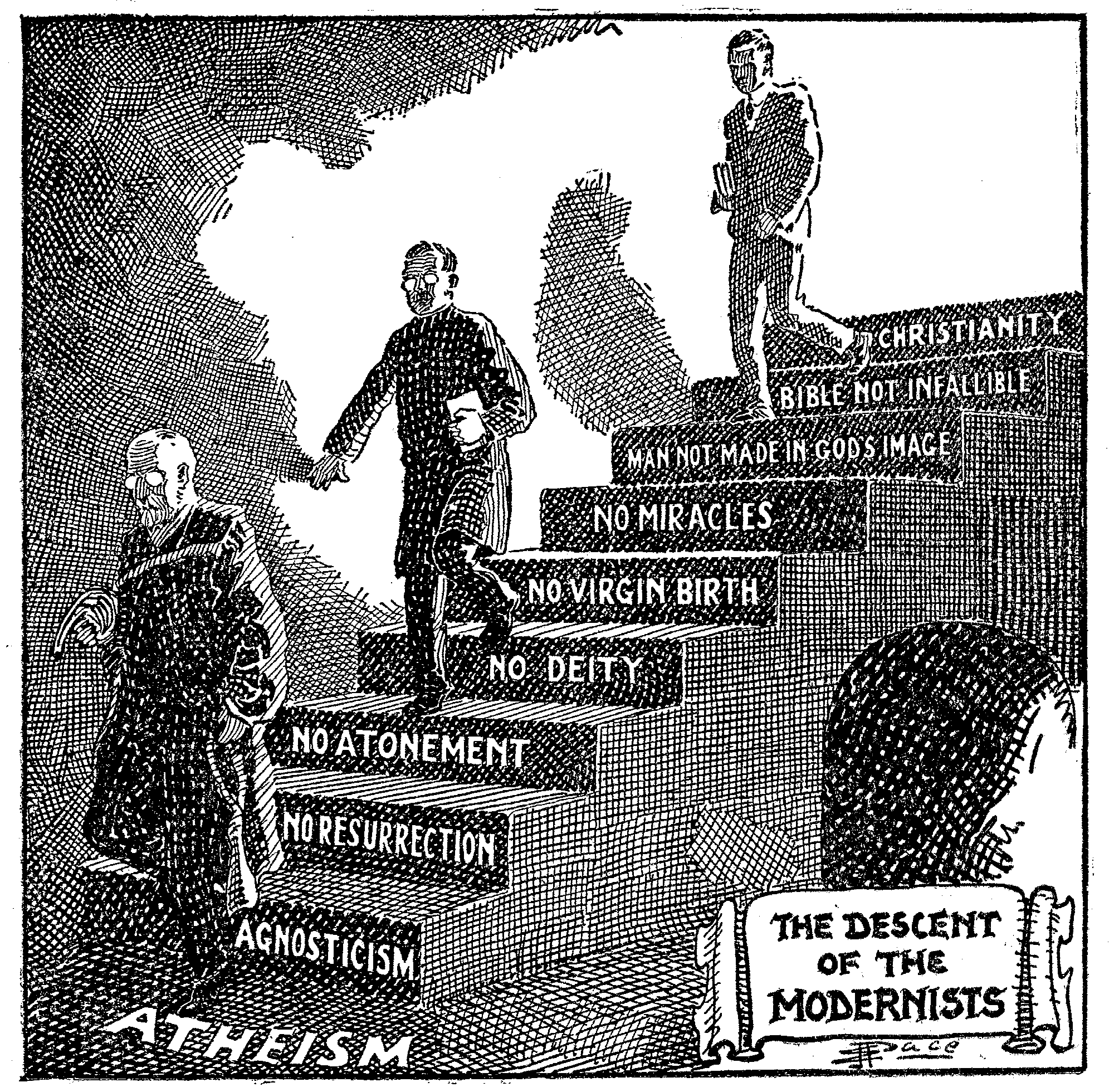
This is soaring prose from a towering man, but the war between science and religion must end, and a cease-fire must be drawn between evolutionary theory and creationism/Intelligent Design. If we do not settle the dispute we will continue to wallow in the intellectual mire that ended the life of one of America’s greatest orators. To paraphrase Bryan’s most famous line: We should not press down upon the brow of science this crown of religious thorns; we should not crucify religion upon a cross of scientific gold.9
The General Reason Why People Do Not Accept Evolution
The syllogistic reasoning behind the general fear of evolution is as follows:
Evolution implies that there is no God, therefore…
Belief in the theory of evolution leads to atheism, and…
Without a belief in God there can be no morality or meaning, therefore…
Without morality and meaning there is no basis for a civil society, and therefore…
Without a civil society we will be reduced to living like brute animals.
This is what bothers most people about evolutionary theory, not the technical details of the science. Most folks don’t give one wit about adaptive radiation, allopatric speciation, phenotypic variation, assortative mating, allometry and heterochrony, adaptation and exaptation, gradualism and punctuated equilibrium, and the like. What people want to know is this:
If my kids learn about evolution in school are they going to become atheists?
If evolution is true on what basis should I be good?
If evolution happened where do I find meaning in life?
If everyone accepts the theory of evolution will society fall apart?
Here is how Intelligent Design theorist William Dembski articulated the argument in a debate with the Young Earth Creationist Henry Morris in 2005:
Dismantling materialism is a good thing. Not only does intelligent design rid us of this ideology, which suffocates the human spirit, but, in my personal experience, I’ve found that it opens the path for people to come to Christ. Indeed, once materialism is no longer an option, Christianity again becomes an option. True, there are then also other options. But Christianity is more than able to hold its own once it is seen as a live option. The problem with materialism is that it rules out Christianity so completely that it is not even a live option. Thus, in its relation to Christianity, intelligent design should be viewed as a ground-clearing operation that gets rid of the intellectual rubbish that for generations has kept Christianity from receiving serious consideration.10
This general fear leads to specific fears about evolution.
Specific Reasons Why People Do Not Accept Evolution
Thomas Henry Huxley (“Darwin’s bulldog”) proclaimed that the Origin of Species was “the most potent instrument for the extension of the realm of knowledge which has come into man’s hands since Newton’s Principia,” and lamented to himself: “How extremely stupid not to have thought of that.” The Harvard biologist Ernst Mayr, arguably the greatest evolutionary theorist since Darwin, asserted: “it would be difficult to refute the claim that the Darwinian revolution was the greatest of all intellectual revolutions in the history of mankind.” The Harvard paleontologist and historian of science Stephen Jay Gould called the theory of evolution one of the half dozen most important ideas in the entire history of Western thought. The Oxford evolutionary biologist Richard Dawkins inquired what common ground we could find for conversation with an extra-terrestrial intelligence, and answered “evolution” because it is “a universal truth” that is likely common throughout the cosmos.11
If the theory of evolution is so profound and proven, why doesn’t everyone accept it as true? (Please note that I use the verb “accept” instead of the more common expression “believe in.” Evolution is not a religious tenet to which one swears allegiance to or belief in as a matter of faith. It is a factual reality of the empirical world. Just as one would not say “I believe in gravity,” one should not proclaim “I believe in evolution.” In science, we do not strive to believe in things that must be believed in to be true.) I would like to suggest that are at least five specific reasons for the resistance to evolutionary theory.
- A general resistance to science. This reaction falls under the rubric of what I call the Conflicting Worlds Model of the relationship of science and religion, where one is forced to choose one over the other. In particular, if scientific discoveries do not appear to support religious tenets, believers tend to opt for religion, nonbelievers for science.
- Belief that evolution is a threat to specific religious tenets. Objections given to the theory of evolution of this sort often fall under the rubric of the Same Worlds Model, in which an attempt is made to use science to prove religious tenets, or to mold scientific findings to fit religious beliefs. For example, the attempt to prove that the Genesis creation story is accurately reflected in the geological fossil record has led many creationists to conclude that the Earth was created within the past 10,000 years. This is in sharp contrast to the geological evidence for a 4.6 billion-year old Earth. If one insists on the findings of science squaring true with religious doctrines, this can lead to conflict between science and religion.
- Misunderstanding of evolutionary theory. A significant source of evolution denial (the doppelganger of Holocaust denial, in that evolution deniers use similar techniques of rhetoric and debate as Holocaust deniers),12 is that most people know so little about the theory. In a 2001 Gallup poll, for example, a quarter of the people surveyed said they didn’t know enough to say whether they accepted evolution or not, and only 34 percent considered themselves to be “very informed” about the theory. Because evolution is so controversial, public school science teachers typically drop the subject entirely rather than face the discomfort aroused among students and parents. What is not taught is not learned. Even those who profess belief in the theory of evolution have a difficult time explaining how it works, typically offering a Lamarkian explanation involving the inheritance of acquired characterstics (with the iconic example of giraffs that stretch their necks to reach leaves high up on trees give birth to baby giraffs with longer necks).13
- The fear that evolution degrades our humanity. After Copernicus toppled the pedestal of our cosmic centrality, Darwin delivered the coup de grace by revealing us to be “mere” animals, subject to the same natural laws and historical forces as all other animals. Copernicus no longer generates controversy because his theory of heliocentrism is about the relative place and position of cosmic real estate, whereas Darwin’s theory remains controversial because it is about us, which we take personally.
- The equation of evolution with ethical nihilism and moral degeneration. This sentiment was expressed by the neo-conservative social commentator Irving Kristol in 1991: “If there is one indisputable fact about the human condition it is that no community can survive if it is persuaded—or even if it suspects—that its members are leading meaningless lives in a meaningless universe.”14 Similar fears were raised by Nancy Pearcey, a fellow of the Discovery Institute in a briefing on Intelligent Design before a House Judiciary Committee of the United States Congress. She cited a popular song urging “you and me, baby, ain’t nothing but mammals so let’s do it like they do on the Discovery Channel.” Pearcey went on to claim that since the U.S. legal system is based on moral principles, the only way to generate ultimate moral grounding is for the law to have an “unjudged judge,” an “uncreated creator.”15
- The fear that evolutionary theory implies we have a fixed human nature. The first five reasons for the resistance to evolutionary theory come almost exclusively from the political right. This last reason originates from the political left, primarily from progressives and liberals who fear that the application of evolutionary theory to human thought and action implies that political policy and economic doctrines will fail because the constitution of humanity is stronger than the constitutions of states. This is what I call Cognitive Creationism—evolution from the neck down—the doppelganger of Conservative Creationism.16
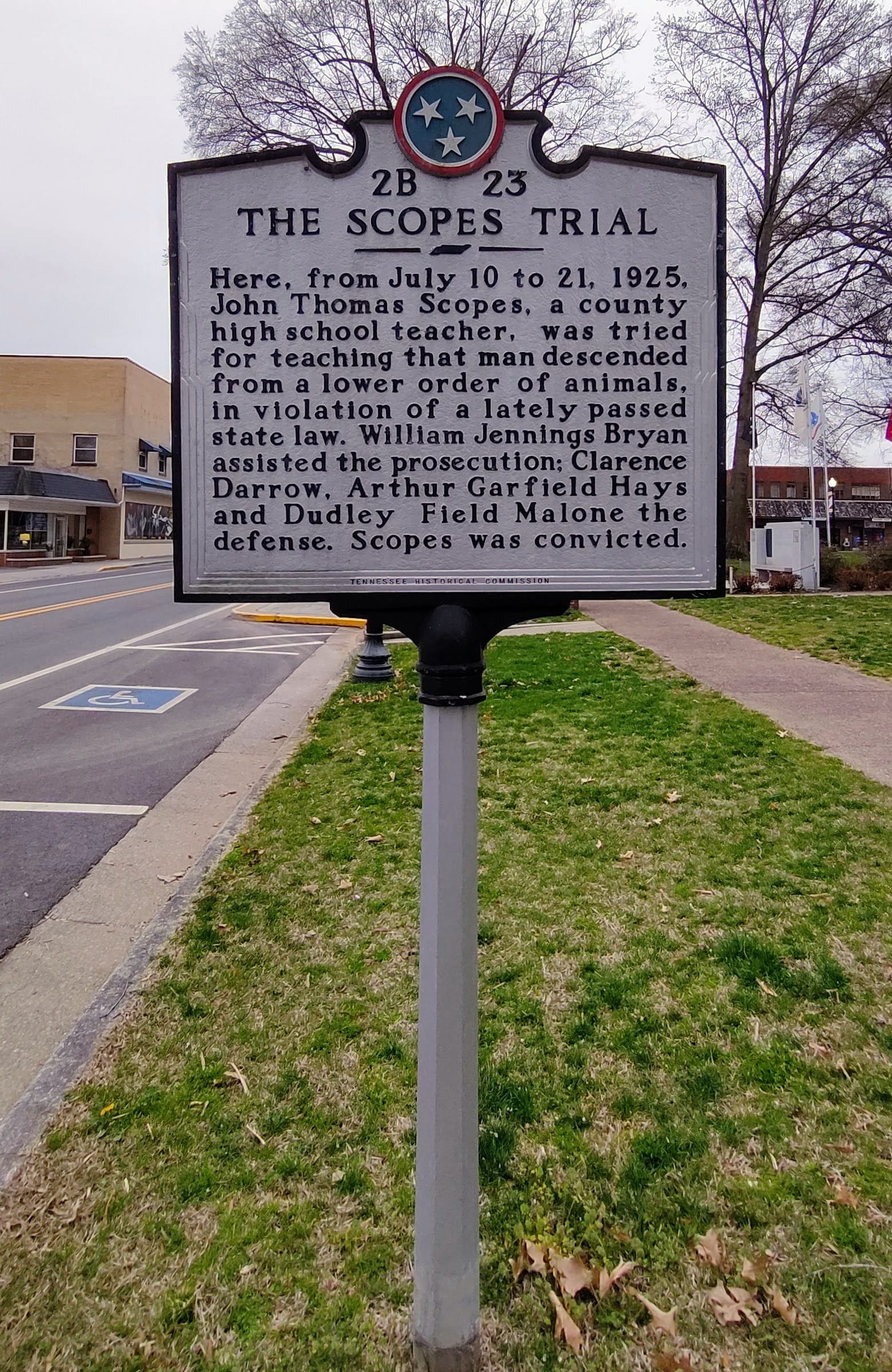
Why People Should Not Fear Evolution
If one is a theist, it should not matter when God made the universe—10,000 years ago or 10,000,000,000 years ago. The difference of six zeros is meaningless to an eternal and omnipotent being, and the glory of divine creation cries out for praise regardless of when it happened. Likewise, it should not matter how God created life—whether it was through a miraculous spoken word or through the natural forces of the universe that He created. The grandeur of God’s works command awe regardless of what processes He used. Here is how Charles Darwin himself thought about the religious implications of his theory, in the 2nd edition of On the Origin of Species, 1860:
I see no good reason why the views given in this volume should shock the religious feeling of any one. It is satisfactory, as showing how transient such impressions are, to remember that the greatest discovery ever made by man, namely, the law of the attraction of gravity, was also attacked by Leibnitz, ‘as subversive of natural, and inferentially of revealed, religion.’ A celebrated author and divine has written to me that ‘he has gradually learnt to see that it is just as noble a conception of the Deity to believe that He created a few original forms, capable of self-development into other and needful forms, as to believe that He required a fresh act of creation to supply the voids caused by the actions of His laws.17
Theists and theologians should embrace science, especially evolutionary theory, for what it has done to reveal the magnificence of the divinity in a depth never dreamed by our ancient ancestors. We have learned a lot since the Scientific Revolution, and that knowledge should never be dreaded or denied. Instead, science should be embraced by all who cherish human understanding and wisdom, or else, as the book of Proverbs (11:29) warned (and from whence the film version of the Scopes Trial got its title):
He that troubleth his own house shall inherit the wind: and the fool shall be servant to the wise of heart.